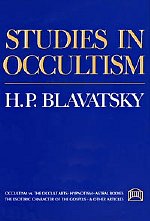
Studies in Occultism
H. P. BlavatskyOccultism (from the Latin occultus, meaning "hid") as presented here refers primarily to the esoteric theosophy concealed in religion and nature. In this series of articles, Blavatsky clarifies the "essential difference between theoretical and practical Occultism," and the gulf that separates harmful occult practices from the occult path of altruism.
Also included is a timely three-part article on "The Esoteric Character of the Gospels" which casts revealing light on the mystery of Jesus — as man and as Christ — and also upon the succession of messianic ages.
- 5 1/8 x 7 5/8, 218 pages
- Coming soon: $17.00 paper ISBN 978-0-911500-09-7
Ordering information
Link to Full-text online edition
Definition of "occult" from Back Cover:
The term occult has noble, but largely forgotten origins. Derived from the Latin occultus meaning "hidden," it properly defines anything which is undisclosed, concealed, or not easily perceived. Early theologians, for example, spoke of "the occult judgment of God," while "occult philosopher" was a designation for the pre-Renaissance scientist who sought the unseen causes regulating nature's phenomena. In astronomy, the term is still used when one stellar body "occults" another by passing in front of it, temporarily hiding it from view.
Writing a century ago, when the word had not acquired today's mixed connotations, H. P. Blavatsky defined occultism as "altruism" — the divine wisdom or hidden theosophy within all religions. Occultism is founded on the principle that Divinity is concealed — transcendent yet immanent — within every living being. As a spiritual discipline occultism is the renunciation of selfishness; it is the "still, small path" which leads to wisdom, to the right discrimination between good and evil, and the practice of altruism.